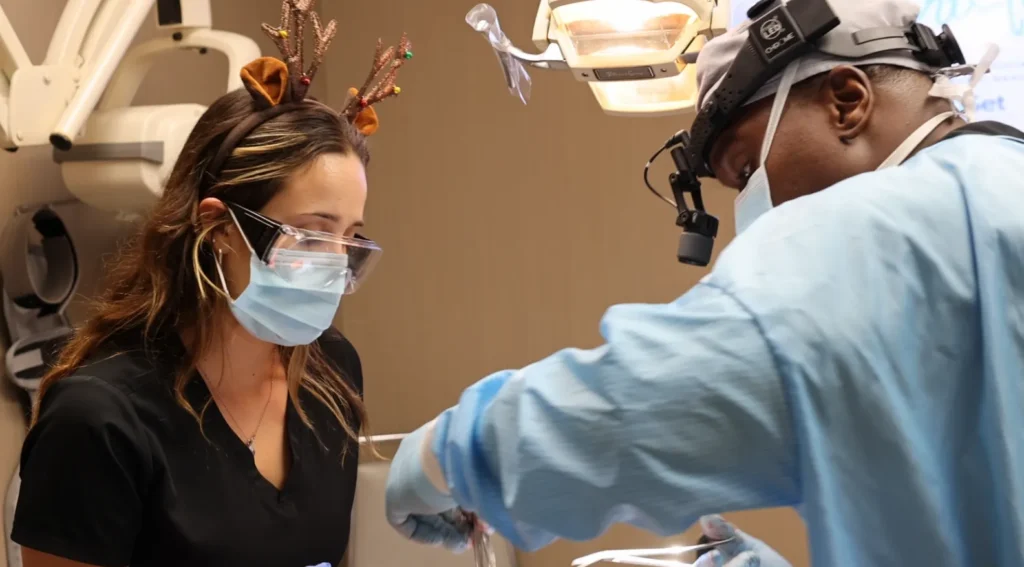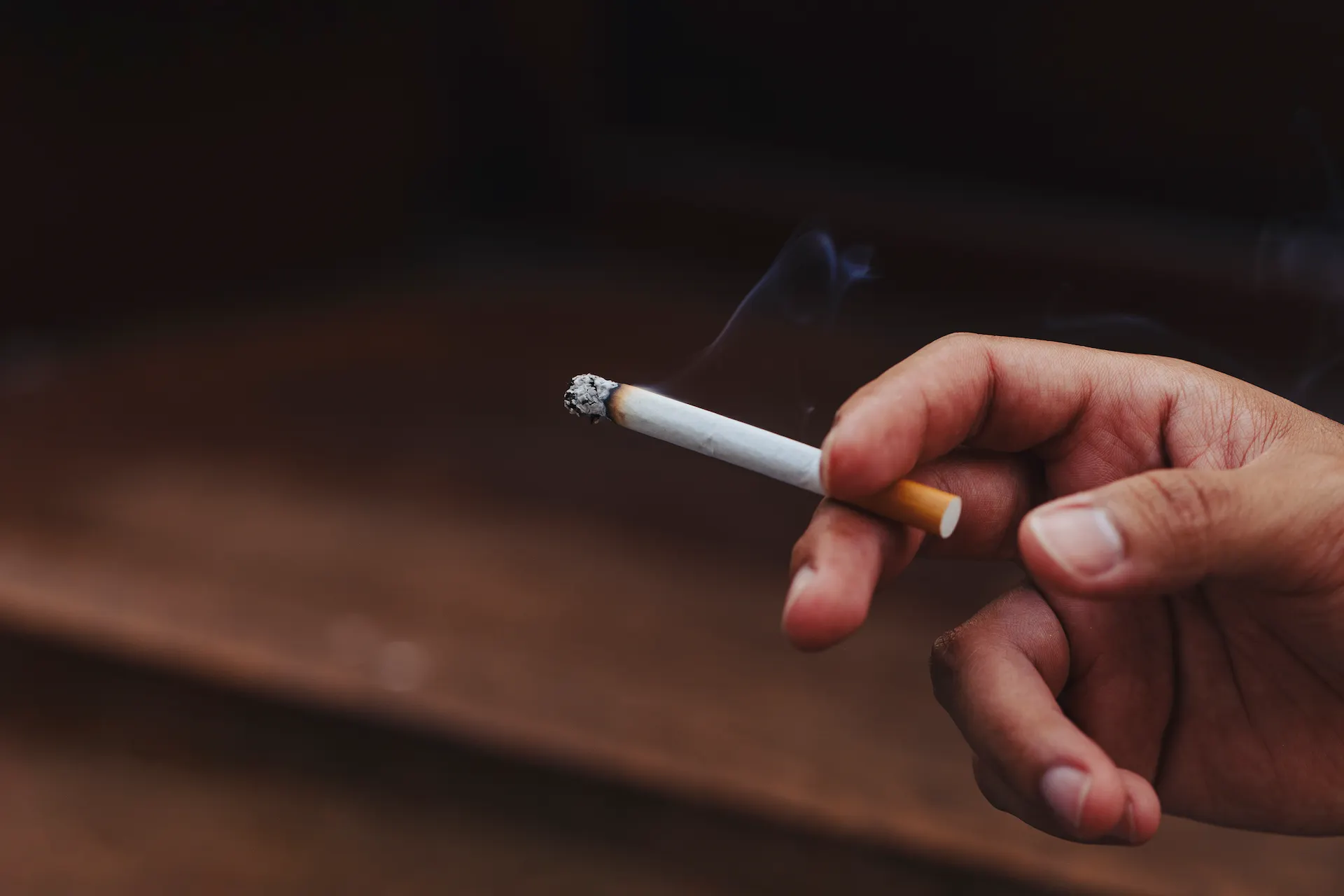According to the CDC, over 20 million people in the U.S. smoke cigarettes. If you are one of them and have experienced tooth loss, you might be concerned about how smoking affects your eligibility for dental implants.
The good news is, yes, you can get dental implants if you smoke. Smoking does not automatically disqualify you from getting dental implants. However, smoking can negatively impact the success of your treatment.
Let’s discuss how in detail below!
Can I Get Dental Implants If I Smoke?
Yes, you can get dental implants if you smoke. Smoking does not automatically prevent you from receiving this treatment. However, it’s essential to understand that smoking can affect the outcome of your dental implant procedure.
When you smoke, the chemicals in cigarettes can interfere with the healing process and increase the risk of complications. This means that while you can still get dental implants, the success rate may be lower compared to non-smokers.
During your initial consultation with us at NuSet Dental Implants and Oral Surgery, our oral surgeon will carefully assess your overall health and oral health before deciding if dental implants are suitable for you. We will consider factors such as gum health, bone density, and your ability to follow post-operative care instructions.
To improve our patients’ chances of a successful dental implant procedure, we always advise them to quit smoking or at least significantly reduce smoking before and after the surgery. This can help enhance healing and reduce the risk of complications, leading to better outcomes for dental implants.
How Smoking Affects Dental Implants
Smoking can have several negative effects on dental implants. Here are some key ways it impacts the success of the procedure:
It can cause delayed healing
When you smoke, the blood flow to your gums and jawbone decreases. This slower blood flow means your body takes longer to heal after dental implant surgery. Delayed healing can increase the risk of infection and complications.
It may increase the risk of implant failure
Nicotine and other chemicals in cigarettes can weaken your jawbone and gums. These chemicals make it harder for the implant to fuse properly with the bone, a process known as osseointegration. If the implant does not integrate well with the jawbone, it increases the chances of loosening or failure.
Higher risk of infection
Smoking weakens the immune system, making it harder for the body to fight infections, placing smokers at a higher risk of infection after dental implant surgery. Infections around the implant site can lead to peri-implantitis, an inflammatory condition that affects the tissues around the implant. If not treated promptly, this condition can cause the implant to fail.
Smokers are more likely to experience other complications, such as gum disease and bone loss. Gum disease can affect the tissues that support the implant, while bone loss can undermine its stability.
Understanding these risks can help you make informed decisions about your dental implant procedure. Quitting smoking or reducing your smoking habits can significantly improve the chances of a successful outcome.
6 Signs and Symptoms of Implant Failure

It’s important to recognize the signs and symptoms of dental implant failure, especially if you smoke. Early detection can help address issues before they become severe. Here are the common signs to watch for:
Inflamed or bleeding gums
If your gums around the implant are red, swollen, or bleed easily, this could be a sign of peri-implantitis or gum disease. Both conditions can jeopardize the implant’s stability.
Severe oral pain
Persistent pain around the implant site is a warning sign. While some discomfort is normal after surgery, ongoing severe pain could indicate an issue with the implant.
Discomfort while chewing
If you experience pain or discomfort while chewing, it could mean that the implant is not properly integrated with the jawbone or that there is an infection.
Gum recession
Gum recession around the implant exposes more of the implant or its post, which can lead to its loosening and instability.
Swelling at the surgical site
Prolonged swelling after the initial recovery period can signal an infection or other complication related to the implant.
Loose implant or replacement tooth
A loose implant or a feeling that the replacement tooth is moving can indicate that the implant has not fused properly with the jawbone, known as osseointegration failure.
If you notice any of these signs, contact us immediately. Early intervention can help manage complications and increase the likelihood of preserving the implant.
How to Quit Smoking
Quitting smoking is one of the best steps you can take to improve the success of your dental implants and overall health. Here are some practical tips to help you quit smoking:
Join a support group
Connecting with others who are also trying to quit smoking can provide encouragement and motivation. Support groups offer a sense of community and accountability, which can make the quitting process easier.
Use nicotine replacement therapy
Nicotine replacement therapy (NRT), such as patches, gum, or lozenges, can help reduce cravings and withdrawal symptoms. Please consult with us before starting any NRT to ensure it’s safe for you.
Seek professional help
Healthcare providers can offer resources and support to help you quit smoking. This may include counseling, medications, or a combination of both. Professional guidance can increase your chances of quitting successfully.
Avoid triggers
Identify and avoid situations or activities that trigger your urge to smoke. Common triggers include stress, alcohol, and being around other smokers. Find healthy alternatives to cope with these triggers, such as exercise or hobbies.
Set a quit date
Choosing a specific date to quit smoking can provide a clear goal and help you stay motivated. Make sure to prepare for this date by removing cigarettes and other smoking-related items from your environment.
Quitting smoking is a process that may require multiple attempts. Stay positive and persistent, even if you experience setbacks. Remember that each attempt brings you closer to quitting for good. You can quit smoking and improve the success rate of your dental implants.
Improve Your Dental Implant Success at NuSet Dental Implant and Oral Surgery
Taking steps to improve the success rate of your dental implants is crucial, especially if you smoke. At NuSet, we are committed to helping you achieve the best possible outcome for your dental implant procedure.
Our experienced team will evaluate your oral health, discuss any risks associated with smoking, and provide personalized care to ensure the success of your dental implants.
Schedule a consultation with us now to discuss your options and take the first step towards a healthier, brighter smile.
Frequently Asked Questions
Does smoking prevent me from getting dental implants?
No, smoking does not automatically prevent you from getting dental implants. However, smoking can increase the risk of complications and reduce the success rate of the procedure. Dentists will carefully assess your oral and overall health to determine if you are a suitable candidate for dental implants.
How does smoking impact the healing process and success of dental implants?
Smoking negatively affects the healing process by reducing blood flow to the gums and jawbone. This slower blood flow can delay healing, increase the risk of infection, and make it harder for the implant to fuse with the jawbone properly. These factors contribute to a higher rate of implant failure among smokers.
Will I need to quit smoking before or after getting dental implants?
It is highly recommended to quit smoking both before and after getting dental implants. Quitting smoking at least two weeks before the procedure and continuing to abstain during the healing period can significantly improve the success rate of the implants. Smoking cessation helps ensure better blood flow and faster healing, and it reduces the risk of complications.
Are there any additional risks associated with dental implants for smokers?
Yes, smokers face additional risks when getting dental implants. These include a higher likelihood of implant failure, increased risk of infection, delayed healing, and complications such as peri-implantitis (an inflammatory condition affecting the tissues around the implant). Smokers are also more prone to gum disease and bone loss, which can further compromise the success of dental implants.
Can I smoke after my dental implants have fully healed?
Even after the implants have fully healed, smoking can still pose risks. Continued smoking can increase the likelihood of developing gum disease, which can affect the stability and health of the implants. It is best to quit smoking entirely to maintain optimal oral health and ensure the long-term success of your dental implants.





